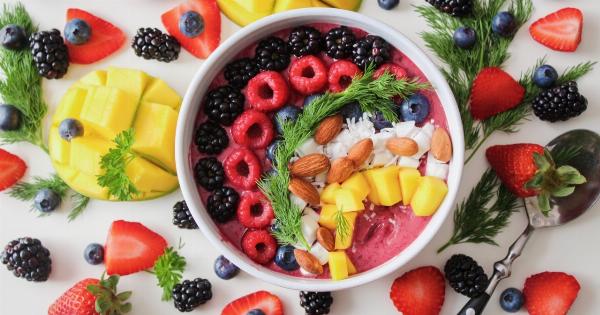As we age, our bodies undergo various changes that can impact our overall health and wellbeing.
From diminished energy levels to an increased risk of chronic diseases, it is essential to incorporate nutrient-rich foods into our diets to maintain optimal health. Beets, pumpkin, and quinoa are three powerhouse ingredients that can help keep age at bay. Packed with essential vitamins, minerals, and antioxidants, these foods offer a range of health benefits that can support healthy aging.
In this article, we will explore the numerous advantages of incorporating beets, pumpkin, and quinoa into our daily meals.
Benefits of Beets
Beets are a vibrant root vegetable known for their rich color and earthy taste. They are an excellent source of essential nutrients, including folate, vitamin C, potassium, and dietary fiber.
Here are some of the key benefits of incorporating beets into your diet:.
1. Promotes Heart Health
Beets contain high levels of dietary nitrates, compounds that can help lower blood pressure and improve overall heart health. Consuming beets regularly has been linked to a reduced risk of heart disease and stroke.
2. Boosts Brain Function
The natural nitrates found in beets can increase blood flow to the brain, promoting cognitive function and potentially reducing the risk of age-related cognitive decline.
They also contain antioxidants that help protect brain cells from oxidative damage.
3. Supports Digestive Health
With their high fiber content, beets are excellent for maintaining a healthy digestive system. Fiber promotes regular bowel movements, prevents constipation, and supports a healthy gut microbiome.
Benefits of Pumpkin
Pumpkin is not only a seasonal favorite but also a nutritional powerhouse. It is rich in vitamins, minerals, and antioxidants, making it an excellent addition to an anti-aging diet. Here are some benefits of incorporating pumpkin into your meals:.
1. Provides Skin Health Benefits
Pumpkin is packed with beta-carotene, a potent antioxidant that helps protect the skin from free radical damage and contributes to a youthful complexion. It also contains vitamins A and C, which promote collagen production and skin cell renewal.
2. Supports Eye Health
The rich orange color of pumpkin is a result of its high content of beta-carotene, which converts into vitamin A in the body. Vitamin A is essential for good vision and may help reduce the risk of age-related macular degeneration.
3. Boosts the Immune System
Pumpkin is a great source of vitamin C, an essential nutrient for a healthy immune system. Adequate vitamin C intake can help reduce the severity and duration of common illnesses, such as colds and flu.
Benefits of Quinoa
Quinoa has gained popularity in recent years due to its versatile nature and impressive nutritional profile. This gluten-free grain is high in protein and rich in essential amino acids, making it an ideal addition to any balanced diet.
Here are some benefits of incorporating quinoa into your meals:.
1. Aids in Weight Management
Quinoa is a nutrient-dense food that provides a feeling of satiety and can help control hunger cravings. It is lower in calories compared to many other grains and is an excellent source of dietary fiber.
2. Supports Bone Health
Quinoa contains high levels of minerals like magnesium, phosphorus, and manganese, all of which contribute to maintaining healthy bones and preventing age-related bone loss. It is also a suitable alternative for those following a gluten-free diet.
3. Regulates Blood Sugar Levels
Quinoa is a complex carbohydrate that releases energy slowly, preventing spikes in blood sugar levels. This makes it an excellent option for individuals with diabetes or those looking to manage their blood glucose levels effectively.
Tasty Ways to Incorporate Beets, Pumpkin, and Quinoa into Your Diet
Now that we understand the numerous health benefits associated with beets, pumpkin, and quinoa, let’s explore some delicious ways to incorporate these ingredients into our meals:.
1. Roasted Beet Salad
Roast beets in the oven, then toss them with fresh greens, crumbled goat cheese, and a balsamic vinaigrette for a delicious and nutritious salad.
2. Pumpkin Soup
Blend roasted pumpkin with vegetable broth, spices, and a touch of coconut milk for a warm and comforting soup option. Top with roasted pumpkin seeds for added crunch.
3. Quinoa Stir-Fry
Sauté cooked quinoa with a variety of colorful vegetables, such as bell peppers, carrots, and snap peas. Add your choice of protein, such as tofu or shrimp, for a complete and satisfying meal.
4. Beet, Pumpkin, and Quinoa Buddha Bowl
Create a vibrant Buddha bowl by combining cooked quinoa, roasted beets, roasted pumpkin, leafy greens, and your favorite dressing. Sprinkle with pumpkin seeds for added texture.
Conclusion
Incorporating beets, pumpkin, and quinoa into our diets provides numerous health benefits that can support healthy aging.
From promoting heart and brain health to enhancing skin complexion and supporting bone strength, these ingredients are packed with essential vitamins, minerals, and antioxidants. By making delicious and nutritious meals using beets, pumpkin, and quinoa, we can take a proactive approach in keeping age at bay and enjoying a vibrant and healthy future.































